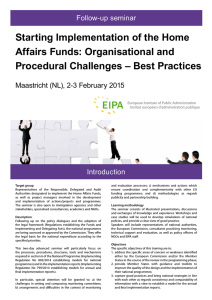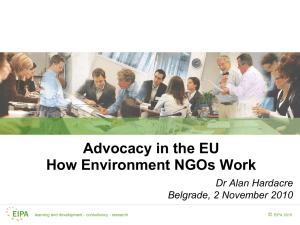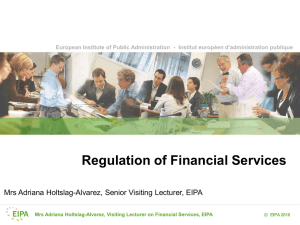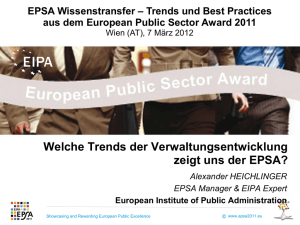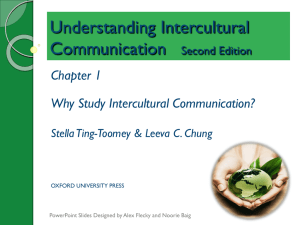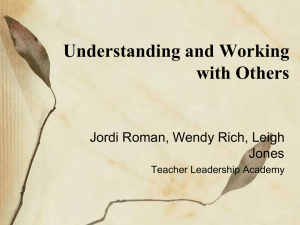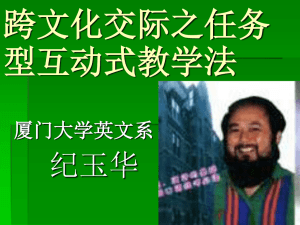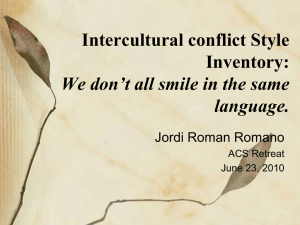Culture programme 2007-2013
advertisement
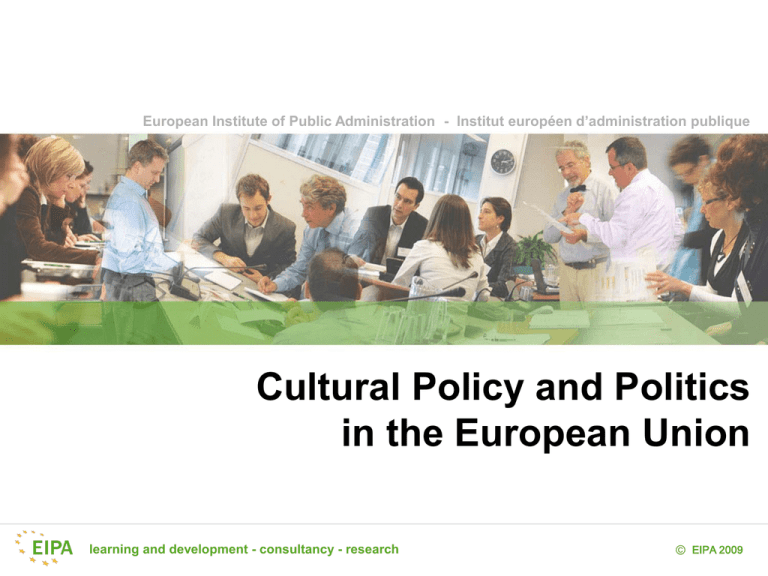
European Institute of Public Administration - Institut européen d’administration publique Cultural Policy and Politics in the European Union learning and development - consultancy - research © EIPA 2009 Global European Challenges and Culture Population ageing = intergenerational problems, lack of work force Migration = intercultural understanding Deficit of creativity = innovation gap, competitiveness © EIPA 2009 - WWW.EIPA.EU Global European Challenges and Culture Legitimacy of the European project = shift from integration of the States to integration of people EU governance in the global society Climatic changes © EIPA 2009 - WWW.EIPA.EU How Culture can respond? Main Goal: Unzipping creative potential of each individual citizen as the key element of the future Creativity – future of the society Creativity could be applied into: Social Interactions -Communications Human Production-Innovation © EIPA 2009 - WWW.EIPA.EU European Agenda for Culture Culture part of the political agenda: More co-operation between MS More structured dialogue with the cultural sector Better linkage with the Lisbon Agenda UNESCO Convention on cultural diversity © EIPA 2009 - WWW.EIPA.EU European Agenda for Culture First objective: Cultural Diversity and Intercultural Dialogue Promote genuine intercultural dialogue – open and respectful exchanges Foster intercultural skills – foreign languages, cultural awareness and expression, civic responsiblility and participation Make it easier for artists to work abroad – and giving the public a chance to see cultural output © EIPA 2009 - WWW.EIPA.EU European Agenda for Culture Second objective: Culture as a catalyst for creativity Promote creativity in education Promote capacity building in cultural sector Develop creative partnerships with other sectors © EIPA 2009 - WWW.EIPA.EU European Agenda for Culture Third objective: Culture as a key component in international relations Implementing the UNESCO Convention on the Protection and the Promotion of the Diversity of Cultural Expressions Integration of the cultural dimension into all its external and development policies, projects and programmes © EIPA 2009 - WWW.EIPA.EU European Agenda for Culture 2007 Communication on Culture Objectives: Cultural diversity and intercultural dialogue Culture as catalyst for creativity Culture as a vital element in the Union's international relations © EIPA 2009 - WWW.EIPA.EU European Agenda for Culture Promote mobility in the cultural field Promote intercultural competences and intercultural dialogue Need to shift from “ multicultural” societies to “intercultural” ones Intercultural interaction and tolerance Proper Management of the diversity Properly managed diversity is an asset for Social inclusion and security Economic growth © EIPA 2009 - WWW.EIPA.EU European Agenda for Culture New working method A structured dialogue with the cultural sector (cultural forum) Improved coordinating efforts between the Member States and the Commission Mainstreaming in other Community Policies © EIPA 2009 - WWW.EIPA.EU European Agenda for Culture Council Resolution Adopted in November 2007 Endorsing the Communication and setting the priorities Endorsing Open Method of Coordination for selected priorities Council Workprogramme © EIPA 2009 - WWW.EIPA.EU European Agenda for Culture Way Forward Setting the OMC groups = feeding into policy development process Inviting the civil society to build new structures to communicate their needs Revitalising existing instruments Pawing way for new emerging instruments for a nwe EU budget © EIPA 2009 - WWW.EIPA.EU How can we integrate the Culture Sector into the Lisbon/Europe 2020 agenda? Invest in creativity and business education Reinforce the Internal Market for creative people, products and services Promote links between creators and technology © EIPA 2009 - WWW.EIPA.EU European Agenda for Culture Open Method of Coordination Group of mobility Group on creative and cultural industry Transformation o the cultural education network into the OMC group Revitalisation of the Eurostat working group © EIPA 2009 - WWW.EIPA.EU European Agenda for Culture Involving the cultural sector (Platforms) Platform for Intercultural Europe Platform on Access to culture Platform on the potential of culture and creative industries © EIPA 2009 - WWW.EIPA.EU EU Programmes and Actions Culture Programme 2007-2013 European Capitals of Culture EU Prizes Artist Mobility Former Programmes and Actions Library of programme documents Culture in Structural Funds Culture in other EU Programmes (Enterprises, Citizenship, Employment, Regional Development, Tourism, Research,..) © EIPA 2009 - WWW.EIPA.EU Culture programme 2007-2013 Main aim: “ To enhance the cultural area shared by Europeans, which is based on a common cultural heritage, through the development of cooperation activities among cultural operators from eligible countries, with a view to encouraging the emergence of European citizenship” © EIPA 2009 - WWW.EIPA.EU Culture programme 2007-2013 Links with European Years 2008- Intercultural dialogue 2009- Creativity&innovation 2010- Combating poverty and social exclusion 2011- Volunteering 2012- Active Ageing Aim: awareness raising of important issues, exchanging good practices, policy debate © EIPA 2009 - WWW.EIPA.EU Culture programme 2007-2013 Three main objectives: To promote cross-border mobility of those working in the cultural sector To encourage the transnational circulation of cultural and artistic output To foster intercultural dialogue Budget of €400 million for the period 2007-2013 For the achievement of these objectives, the programme supports three strands of activities. © EIPA 2009 - WWW.EIPA.EU Culture programme 2007-2013 First Strand: Support for cultural actions This strand enables cultural organisations coming to cooperate on cultural and artistic projects. This strand includes three subcategories: Strand 1.1: Multi-annual sectoral or multi-sectoral co-operation projects, running for a period of three to five years Strand 1.2: Sectoral or multi-sectoral co-operation projects, running over a maximum period of two years Strand 1.3: Support for literary translation is contributes to one of the key objectives of the programme Strand 1.4: Action with third countries that have concluded association or cooperation agreements with the Community, provided that they contain cultural clauses © EIPA 2009 - WWW.EIPA.EU Culture programme 2007-2013 Second Strand: Support for cultural bodies Support to cultural organisations, associations and institutions that play a crucial role in promoting culture and advancing its interests This strand supports cultural bodies which operate or seek to operate at a European level This strand is aimed at promoting a sense of shared cultural experience © EIPA 2009 - WWW.EIPA.EU Culture programme 2007-2013 Third Strand: Analysis and dissemination activities Supports the carrying out of studies and analyses in the field of European cultural co-operation and European cultural policy development The aim of this support is to increase the volume, quality of information and data available on cultural co-operation at the European level © EIPA 2009 - WWW.EIPA.EU Culture programme 2007-2013 Operating grants Support for bodies which pursue an aim of general European interest in the field of culture Co-finance expenditure associated with the permanent work of these organisation 4 categories of activities: Ambassadors, advocacy networks, festivals, policy support structures for cultural agenda © EIPA 2009 - WWW.EIPA.EU Culture programme 2007-2013 Special actions European Capitals of Culture 2008: Liverpool, Stavanger; 2009: Linz, Vilnius; 2010: Istanbul, Pécs, Essen for the Ruhr; 2011: Turku, Tallinn European prizes: Cultural Heritage, Contemporary architecture, Pop music (European Border Breakers' Award), Contemporary literature Support for cooperation with 3rd countries © EIPA 2009 - WWW.EIPA.EU Culture programme 2007-2013 Analysis & dissemination Studies and analysis Dissemination of information Efforts to maximise the impact of projects Culltural contact points: promote the programme at local level assist applicants provide information on other relevant sources of funding © EIPA 2009 - WWW.EIPA.EU Culture programme 2007-2013 Promoting results “valorisation” The Commission plans to hold an annual event aimed to: Help to ensure lasting impact of projects Draw out synergies between Programme and political agenda Bring together cultural operatorsand policy makersfor mutual learning © EIPA 2009 - WWW.EIPA.EU Culture programme 2007-2013 Other sources of funding Cultural operators may Community Programmes: also be eligible under other Lifelong Learning, Youth in Action, Europe for Citizens, research, structural funds Media for auddiovisial sector Europe aid © EIPA 2009 - WWW.EIPA.EU © EIPA 2009 - WWW.EIPA.EU Culture programme 2007-2013 Website: http://ec.europa.eu/culture/index_en.htm How to find your cultural contact point: http://ec.europa.eu/culture/annexesculture/doc1232_en.htm © EIPA 2009 - WWW.EIPA.EU Contact Address Marco Lopriore Senior Lecturer Tel. +31 43 3296 316 Fax +31 43 3296 296 E-mail: m.lopriore@eipa.eu Consult our EIPA web site: http://www.eipa.eu © EIPA 2009 - WWW.EIPA.EU
